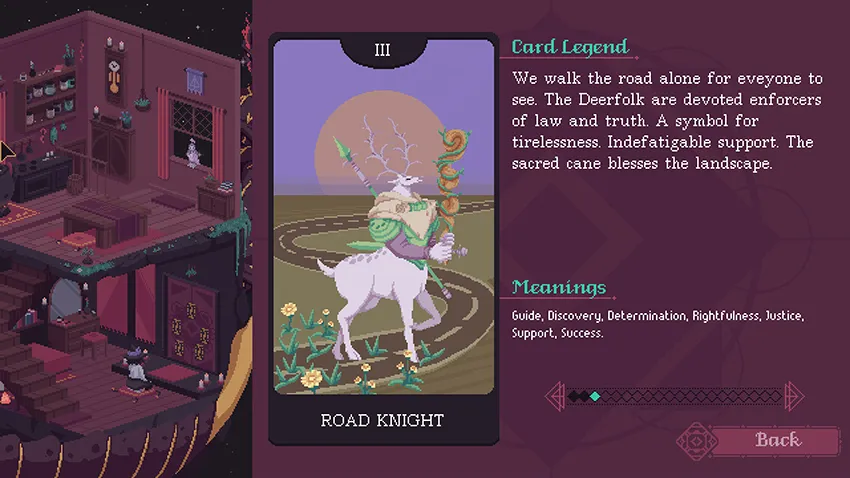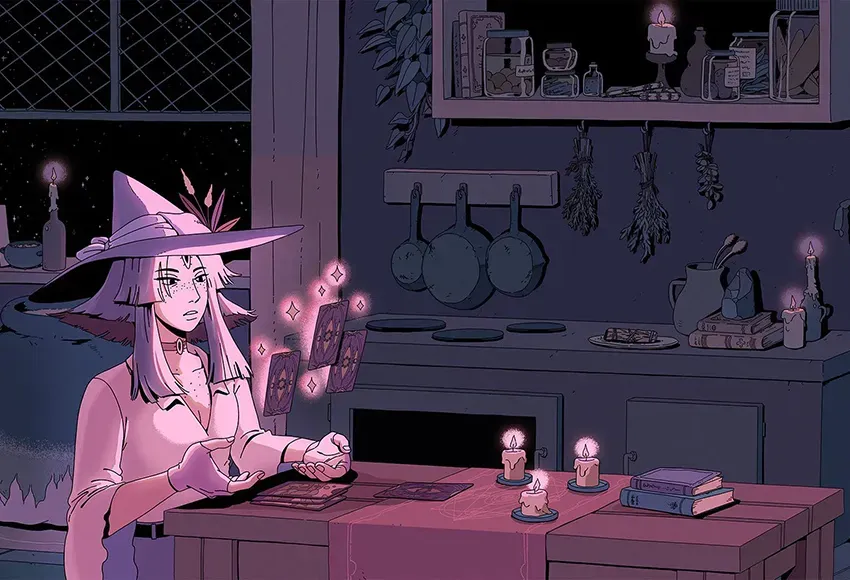Whether or not one is skeptical about the fortune-telling power of tarot, there's no denying that it's a sticky concept. Unlike astrology, it's not quite pervasive enough to show up in a good portion of online dating profiles, but if you're in the LGBTQ community, the odds are pretty good that you know someone who owns a tarot deck.
You may also know, then, that choosing a deck can be a deeply personal affair. While each one usually consists of the same 56 suit cards, plus the 22 "major arcana" used for divination – The Moon, The High Priestess, The Fool, and so on – the art on those cards distinguishes one deck from another. A furry might opt for animal symbolism, while a mycologist might prefer art with mushrooms.
The Cosmic Wheel Sisterhood is a game that plays beautifully to that personal decision about tarot art, by letting players have a hand in designing it themselves. It tells the story of Fortuna, a witch who, after centuries of exile, enlists the help of a demon to rebuild her fortune-telling deck and free herself from her cosmic prison.
It comes during what could be called a renaissance of games in the "deckbuilder" genre, which is distinct from most collectible card games in that decks aren't put together in advance; rather, players start with a few basic cards, and then gain more as the game progresses.
These games rarely dwell on the symbolism of the cards themselves, however, even when they bother with a narrative deeper than "reach the final boss and defeat it." The most enigmatic and famous deckbuilder so far is likely Inscryption, but even its narrative is impersonal and fairly linear, and is better left unspoiled anyway.

Building a deck
Building your deck in Sisterhood is all about the symbolism. You create each card in your deck by choosing from a set of lurid backgrounds, and then adding a mystical figure and an esoteric accessory. For example, one might choose "The Opera House" background with a "Deer Knight" and "The Glass Trident."
From those components, you're given the freedom to build a kind of collage, repositioning and resizing them, or adding little extras. And when you're finished, the game interprets the card by mashing the stories of those components together into something new.
You might have a ballpark idea of a card's themes as you're building it, but there's a dizzying number of combinations – enough that you won't see them all during one playthrough. Those themes matter, because you'll be using your deck to tell the fortunes of different visitors as the game's plot progresses. It's all very mysterious, as magic should be.
A given card never has just one possible interpretation. You get to choose from at least three for each card drawn during a reading, and it's implied that this choice holds real sway over a character's fate. Fortuna's readings have never been wrong.
One might think it best, then, to interpret the cards as kindly as possible, but there's a finger on the scales: each interpretation awards the player with a different type and amount of card-building resource. What's one stranger's mishap if you can add an especially portentous new card to the deck for next time? And what options will give you the upper hand in your situation?
After all, Fortuna has enemies, if her exile didn't make that clear from the start. The game's atmosphere is peaceful and reflective, but it comes with an edge. Even as you spend much of your game time in a house floating in the void of space, listening to gentle ambient music and mulling over card designs, the cosmic, shrimp-tailed behemoth you summoned is a reminder of the forbidden pact you made with it – one that comes with an eventual sacrifice.
If you're into that, you're in luck, because Abramar (that's the behemoth) casually propositions Fortuna pretty early on. He also makes for a great tutorial, easing the player into the process of making cards as he seals each portion of the pact.
The Cosmic Wheel Sisterhood is more of a visual novel than a deck builder, so tacticians might prefer to look elsewhere. But the studio that made it, Desconstructeam, has been most consistently praised for the quality of its writing, which here may have found its most fitting form yet.
Players should note that the game warns of "mature themes" like mental health, self-harm, suicide, gender dysphoria, and discrimination.


